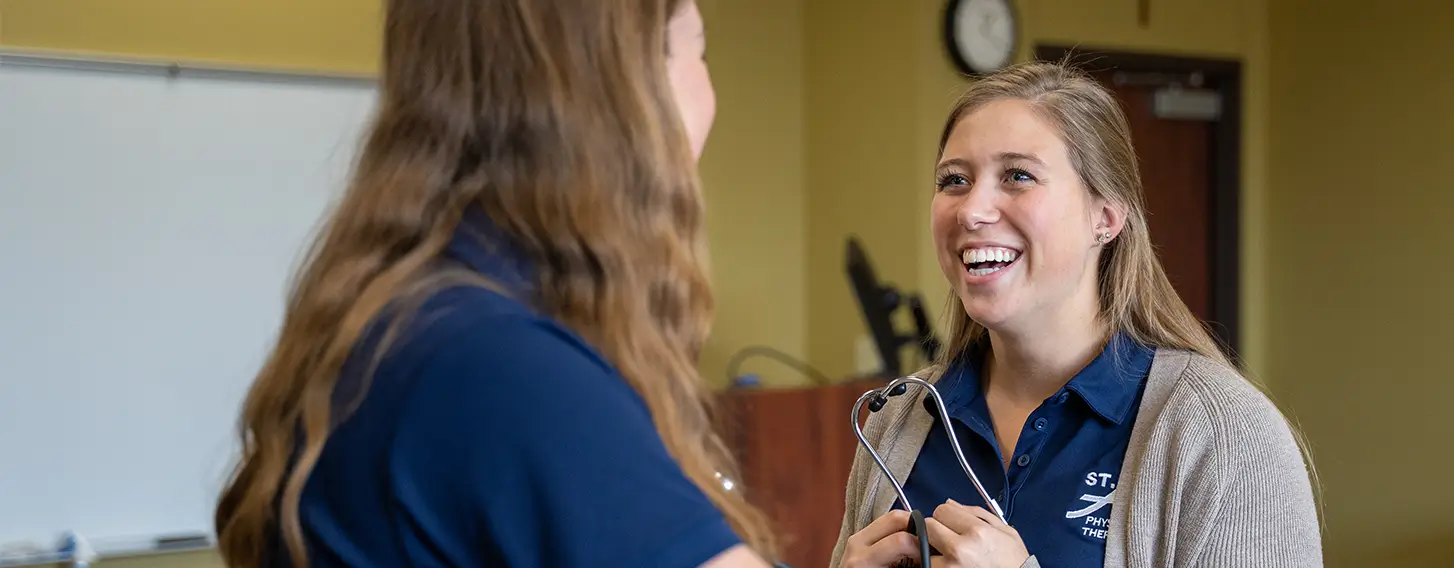What are the admission requirements for the DPT program at St. Ambrose University?
There are three pathways into St. Ambrose University's DPT program. The first is a traditional pathway for college seniors and college graduates. High school seniors and college juniors can also apply for an accelerated pathway to the DPT. Each pathway has unique admissions requirements and instructions on how to apply.
Our application deadline for every track is December 1. If you have questions, reach out to our team at pt@sau.edu or 563-333-6403.
Admissions requirements for college seniors and college graduates (Track III)
Here are the admissions requirements for college graduates or seniors planning to enter our DPT program after graduation:
- Submit all materials through the Physical Therapist Centralized Application Service (PTCAS). PTCAS charges a fee for the first program you apply to and an additional fee for each additional program. SAU does not have an additional supplemental fee.
- Submit official transcripts from all institutions of higher education that you have attended through PTCAS. Do not send your transcripts to SAU.
- Include documentation of a minimum of 20 hours (50 hours are recommended) of clinical observation in two or more physical therapy practice settings, with licensed physical therapists. The hours must be completed at the time of submission of the application.
- Include two references with your application
- Submit a personal essay (details are provided in PTCAS)
- Send GRE scores to PTCAS (SAU code is #7742)
- Complete a personal, on-site interview with DPT faculty
College seniors and college graduates apply here
Admissions requirements for high school seniors (Track I)
High school students accepted at St. Ambrose University can apply to reserve a spot in the DPT class that begins during their senior year of college. To be eligible, high school students must:
- Have completed the equivalent of one year each of high school biology and chemistry; One year of high school physics is strongly recommended
- Attain a minimum of 3.5/4.0 unweighted high school GPA
- Complete and provide documentation using the DPT Observation Hours Form (.pdf) of at least 10 hours of observation (20 hours recommended) with a licensed physical therapist in one or more physical therapy settings.
- Complete an acceptable on-site personal interview with DPT faculty members
- Complete and submit a PT Department Track I Application
High school seniors apply here
Admissions requirements for college juniors (Track II)
College juniors enrolled at St. Ambrose, Loras College, Augustana College (IL), or Mt. Mercy University can begin taking classes toward their DPT degree during their senior year of college if the following requirements are met:
- Complete an application through the PTCAS system by December 1 (see additional details under Track III instructions above)
- Students from institutions other than SAU will need a letter from their Registrar's Office indicating that the first year of DPT courses will be credited toward the bachelor's degree and that the bachelor's degree will be awarded prior to the start of the second year in the DPT Program.
College juniors apply here
Prerequisites for the DPT program
Applicants are not required to select a particular major in order to be eligible for admission to a physical therapy education program. Common undergraduate majors among DPT students at SAU are Exercise Science, Human Performance and Fitness, Sport Management, Psychology, and Biology.
Here are the prerequisites for all students entering St. Ambrose University’s DPT program.
- Attain a minimum 3.0 GPA on a 4.0 scale in all undergraduate coursework (cumulative and prerequisite). Alternatively, attain a minimum 3.25 GPA on a 4.0 scale for 18 or more semester hours in an approved graduate science degree program.
- Completion of all prerequisite courses with a grade of C or higher:
- General Biology (with labs), 8 credits
- Human Anatomy & Physiology I & II (w/ labs), 8 credits
- General Chemistry (with labs), 8 credits
- College Physics (with labs), 8 credits
- Statistics/Biostatistics, 3 credits
- Introduction to Psychology, 3 credits
- Upper Level Psychology/Sociology elective, 3 credits
- Minimum 20 hours of PT observation (50 recommended)
Note: St. Ambrose University Physical Therapy Department will not accept online lab courses to satisfy prerequisite requirements. All lab courses must be taken on campus.
International student requirements
If you live outside of the U.S. there are additional admissions requirements. Here’s what you’ll need:
- All international students are required to submit official results from the TOEFL exam and must score at least 600 (written), 250 (computerized) or 100 (internet).
- International students are required to have their transcripts evaluated through the World Education Services (WES).
- Copy of your passport and other documentation











 >
>



